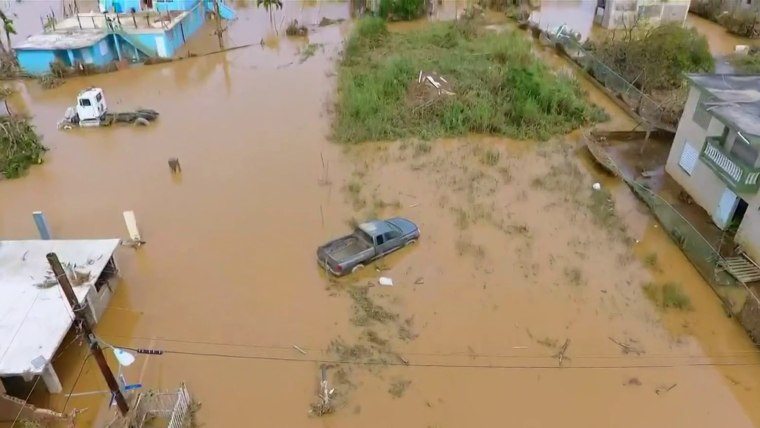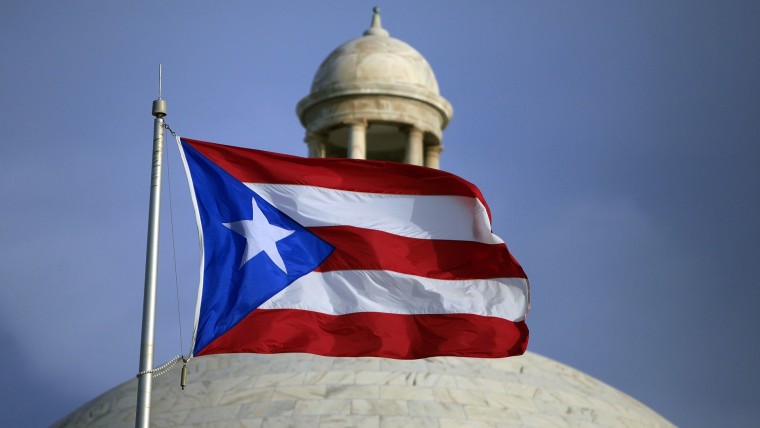Verónica Noriega is not a big coffee drinker, but that didn't stop her from doing something she'd never done before — helping coffee farmers in Puerto Rico pick their first harvest since Hurricane Maria destroyed 85 percent of the coffee crops four years ago.
Noriega, 25, was among a dozen first-time volunteers helping coffee grower Pedro Pons, whose farm, Hacienda Pons in the town of Lares, had been completely wiped out after the deadly 2017 storm.
The initiative Noriega joined was spearheaded by ConPRmetidos, a youth-led independent nonprofit group whose goal is to spur economic development and long-term sustainability in the island archipelago.
The group had distributed 750,000 seedlings to family-owned coffee farms such as Hacienda Pons, which are vital to the economy of Puerto Rico’s small mountainous towns.
Now, the trees are producing their first harvest since their planting in farms in the aftermath of Maria.
“It really gave us a lot of hope that we could get back up again,” said Iris Janette Rodríguez, a coffee grower in the town of Adjuntas and the president of PROCAFE, a nonprofit group created by ConPRmetidos to address the needs of coffee farms in Puerto Rico.
The challenge: a shortage of pickers
Rodríguez said it takes three to five years for a coffee tree to produce its first crop. But coffee farmers such as herself are facing another challenge that puts their miracle harvest at risk — a shortage of pickers. Without enough people to pick coffee beans, part of the harvest could go to waste.
"Coffee is harvested once a year, but the income these crops generate is what drives the mountain economy. Those earnings last for months," Rodríguez, 56, said in Spanish. "We don't want the investment we've made on fertilizers, and our time making sure these trees make it, to be lost."
On Wednesday morning, Eric Torres and some of his coffee pickers were out in his farm in the town of Adjuntas.
"The reality is that it's often not enough," Torres, 55, said of the available pickers. "That's why I was so grateful to welcome these volunteers." A week before, Torres had welcomed volunteers from Puerto Rico's metropolitan area, who had never worked on a farm before.
"You do need certain abilities to be able to pick coffee because of the topography you are exposed to," he said. "They may not be exposed to the countryside often, but they did come here, had a good time and learned about the coffee industry."
Making agriculture sustainable again
Pons, 60, whose family has been growing crops for three decades, said he never misses the weather reports on TV. He gets anxious even when a storm starts forming far from Puerto Rico.
“After what we went through with Maria, to have another hurricane destroy everything we’ve worked so hard to grow ... that would be devastating,” he said.
That's where volunteers like Noriega can make a timely difference while also learning about the families who keep the coffee industry alive.
"They helped me save a coffee tree with produce so ripe that if they didn't pick it up as soon as possible, it could have been lost," Pons said.
"I needed to connect with the earth"
After spending way too much time working from home due to the Covid-19 pandemic, Noriega started feeling “this thing inside of me telling me that I needed to connect with the earth,” she said. “Getting closer to the earth has made me think a lot about issues around food insecurity and how important it is to understand what it is that we consume.”
When Noriega volunteered at Hacienda Pons, she was tasked with picking coffee beans from small trees that were full of ants because of how close they were to the ground.
“I thought I wasn’t going to get dirty because we were picking beans from a tree, so I left my gloves at home,” she said in Spanish. “Well, while I didn’t get dirty, I was bitten by a bunch of ants. So, I learned the hard way that’s always important to wear gloves.”
Despite the rookie mistakes, Pons said it's "not rocket science" to pick coffee. They just have to make sure the bean is as close to red as possible," he said. "But it's certainly hard work."
That is a view shared by Noriega, who helped recruit other volunteers through her job at the nonprofit organization Mentes Puertorriqueñas en Acción, which promotes civic engagement.
“Carrying the basket as you go picking the beans is not easy — I really think these workers don’t get paid what they deserve," she said, speaking of the regular coffee pickers. "We were there for like two hours and we wanted to die, from how tired we were.”
The challenges of curbing a reliance on imports
When Maria devastated Puerto Rico, making it tough to receive and distribute food items, it exposed the U.S. territory's vulnerability to natural disasters and severe lack of homegrown food. Puerto Rico imports about 85 percent of all its food, producing just 15 percent of what’s consumed.
This has contributed to long-standing food insecurity issues that worsened nearly a decade ago, when Puerto Rico embarked on the largest municipal bankruptcy proceeding in U.S. history. Subsequent natural disasters such as hurricanes, earthquakes and the pandemic exacerbated the problem.
Rodríguez said food is mostly imported "because the labor and the cost of producing in Puerto Rico is very high, and we can't compete with the costs from the exterior."
Among the expenses that make coffee production costs so high are electricity and propane gas to roast coffee beans, Pons said. In Puerto Rico, a gallon of propane gas could cost up to $3 and power customers pay twice as much for electricity as U.S. customers for unreliable service.
This is part of the reason why coffee growers such as Pons and Torres sell most or all of their coffee harvests to companies who, unlike them, have the means to process the coffee and sell it to consumers.
"We may not know when the power will go out or when it will come back, but if there's an industry that can make it work with no power and no internet, it's agriculture," Rodríguez said.
Rodríguez expects her coffee harvest to be ready sometime in October and said she's looking forward to welcoming volunteers who can help her pick the coffee beans.
"It's also necessary to educate Puerto Rican consumers about the benefits of consuming local products," Rodríguez said. "They are fresher and safer, since foreign countries don't necessarily have the same restrictions on the use of chemicals or pesticides on their products, and help the local economy."
Follow NBC Latino on Facebook, Twitter and Instagram.
"bring" - Google News
October 02, 2021 at 05:00PM
https://ift.tt/3mh04M2
Puerto Rico coffee growers bring hope after Hurricane Maria - NBC News
"bring" - Google News
https://ift.tt/38Bquje
Shoes Man Tutorial
Pos News Update
Meme Update
Korean Entertainment News
Japan News Update
Bagikan Berita Ini
















0 Response to "Puerto Rico coffee growers bring hope after Hurricane Maria - NBC News"
Post a Comment